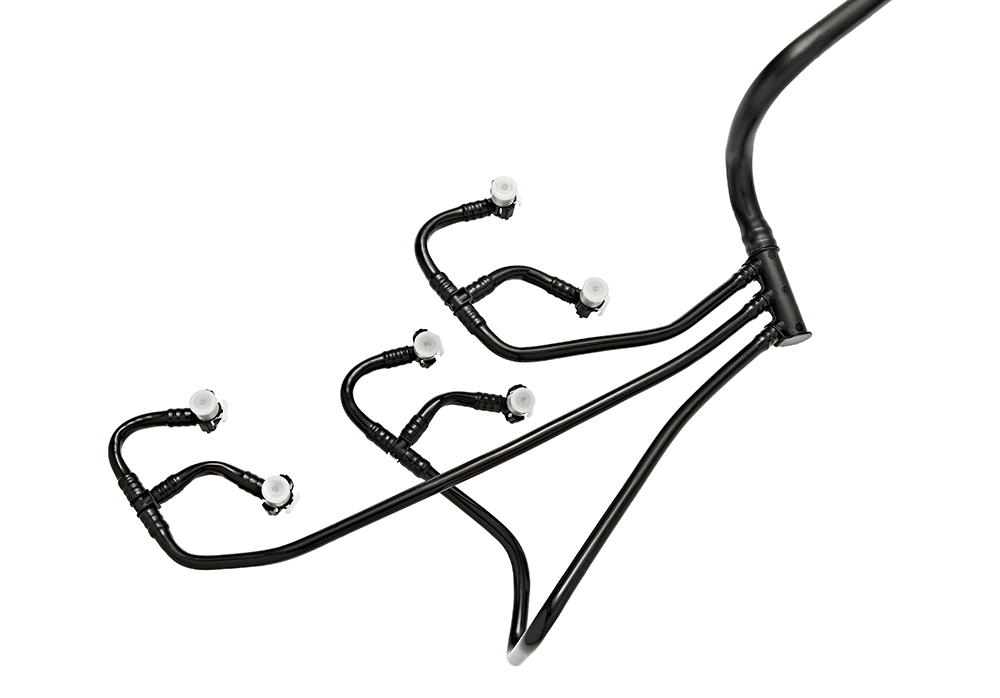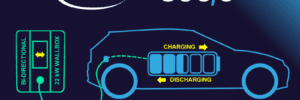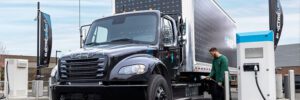The Honda driver said she fell asleep at the wheel, and the police decided not to start an investigation.
Source: Electric Vehicle News
Some Rivian R1T And R1S Units Unable To Charge On AC Due To Faulty Onboard Charger
DC fast charging is still available on affected vehicles and there’s also a possible temporary fix.
Source: Electric Vehicle News
New EV Prices Down 20% Compared To Last Year: Kelley Blue Book
The average transaction price (ATP) for new EVs was $53,438 in June.
Source: Electric Vehicle News
Caterham Project V Debuts: 2,623-Pound EV Sports Car, 268 HP And RWD
Intended to complement the existing Caterham Seven, it could go into production as early as 2025.
Source: Electric Vehicle News
From One Enthused Chevy Bolt Owner To Another
The Chevy Bolt is what’s known as an “orphan car” in auto industry parlance — a vehicle produced by a company brand that has discontinued business. The thing is, current owners really like it.
Source: CleanTechnica Car Reviews RSS Feed
VOSS Automotive introduces new thermal management technologies for EVs and energy storage
German line and connection technology supplier VOSS presented its latest developments in battery energy storage systems (BESS) and immersion cooling at the recent Battery Show 2023 in Stuttgart.
In the field of BESS, which refers to battery module containers, the company has designed what it says is an improved line system with a vent valve and a double flow stop valve to prevent cooling water leakage during battery module removal.

Up to now, immersion cooling has involved circulation of an electrically nonconductive cooling liquid directly around the cells to ensure more efficient heat dissipation and uniform temperature distribution than conventional systems, which use cooling plates to separate cells from the cooling medium. VOSS says it has developed an electrically conductive immersion cooling system that mitigates the risk of static charging through use of valves, quick connection systems and lines that allow voltage to flow toward a grounding point.
VOSS Product Manager Andreas Suhr said, “With our line and valve technology, we enable optimal temperature control for battery modules in BESS containers, facilitating efficient storage of energy from renewable resources and subsequent integration into the power grid.”
Source: VOSS
Source: Electric Vehicles Magazine
EcoG and Infineon work to ensure compatibility of bidirectional chargers and EVs
Munich-based tech company EcoG has presented an ISO-compliant bidirectional charging solution which follows charging standards association CharIN’s guidelines.
EcoG plans to unveil a pre-integrated reference design for bidirectional charging in addition to EcoG Charge Controllers. Together with partner Infineon, a power semiconductor manufacturer, EcoG is developing a starter kit with an integrated 22 kW converter and controller.
As EcoG sees it, a lack of compatibility between charging stations and EVs is an obstacle to more widespread implementation of V2H/V2G. EcoG has tested its V2G/BiDi solution with vehicle manufacturers in accordance with the new ISO 15118-20 bidirectional power transfer (BPT) standard, as well as the BPT Application Guide from CharIN.
As a core member of CharIN, EcoG has played an important role in the application description for the ISO standard. EcoG is also supporting harmonization and alignment between the ISO 15118 and SAE J2847 charging standards for V2G. This should lead to better scalability, compatibility and interoperability. EcoG’s software is designed to support all V2G-capable vehicles—including those still under development.
“The fact that bidirectional charging actually works according to ISO 15118-20 BPT is a major step forward,” said Xi Zhang, EcoG’s Director of E-mobility. “This allows the technology to be applied to the mass market, as customers can now be sure that their wallbox can communicate with any V2G-enabled vehicle in the field.”
“V2G as the standardized feature is essential for broad adoption of this technology,” added co-founder and CEO Jörg Heuer. “Vehicle manufacturers are including the bidirectional wallbox as part of their offerings. EcoG provides the V2G technology in the form of a starter kit to charger manufacturers to enable products with short lead time to market, and to OEMs for interoperability testing.”
Source: EcoG
Source: Electric Vehicles Magazine
US truck-makers pledge to comply with California’s phase-out of ICE vehicles
Some of the nation’s largest truck-makers, including Cummins, Daimler, Ford, GM, Hino, Isuzu, Navistar, Paccar, Stellantis and Volvo, along with the Truck and Engine Manufacturing Association, have pledged to comply with California’s Advanced Clean Fleets (ACF) rule, which will require all new medium- and heavy-duty vehicles sold or registered in the state to be zero-emission by 2036.
In May, after CARB voted to finalize the new rules, several industry trade associations expressed strong opposition (one predicted that ACF would “guarantee a complete dismantling of our state’s trucking industry”).
A railroad industry group recently sued CARB to block new rules that would require companies to purchase zero-emission equipment. The new pledge by truck-makers is part of an agreement aimed at preventing similar lawsuits from trucking industry players. The companies agreed to follow the new rules, and in exchange California regulators agreed to loosen some emission standards for diesel trucks. The state agreed to use the federal emission standard starting in 2027, and also agreed to let truck-makers continue to sell older diesel engines over the next three years, as long as they also sell zero-emission vehicles to offset the emissions from those older trucks.
The agreement is a major step forward—it also clears the way for other states to adopt California’s standards without worrying about whether the rules would be upheld in court, said CARB Executive Officer Steven Cliff. “I think that this sets the stage for a national framework for zero-emission trucks. It’s a really stringent California-only rule, or a slightly less stringent national rule. We still win in the national scenario.”
“This agreement enables the regulatory certainty we all need to prepare for a future which will include ever-increasing volumes of low- and zero-emission technologies,” said Michael Noonan, Director of Product Certification and Compliance for Navistar.
Source: Associated Press
Source: Electric Vehicles Magazine
Chevy Bolt One Month Review — Still 4½ Stars
After living with a Chevy Bolt for a month, I am starting to appreciate what a good car the Chevy Bolt really is.
Source: CleanTechnica Car Reviews RSS Feed
Michigan collaborates with Daimler Truck and DTE Energy to build “the truck stop of the future”
The state of Michigan has announced a federally funded prototype program known as the Mobility Charging Hub, intended to help companies transition fleets to commercial EVs and to test new technologies, digital services and business models for accelerating commercial EV deployment at scale and improving the truck stop experience. The program will also support passenger vehicle charging.
Some $13 million in funding is available, and Michigan has secured initial partnerships with Daimler Truck North America (DTNA) and DTE Energy to test and implement solutions related to EV innovation, fleet management and ease of travel.
The Mobility Charging Hub will be located at DTNA’s Redford facility near I-96. In the program’s first phase, to be operated by DTE, core infrastructure will be established, including EV charging solutions, solar canopies and battery energy storage systems. Third-party operators will be sought for value-added services. The next phase will enable the Hub as an innovation testing platform, similar to such sites as the Detroit Smart Parking Lab, Michigan Central and the FLITE Program at Gerald R. Ford International Airport.
A federal grant of $8.5 million from Rebuilding American Infrastructure with Sustainability and Equity (RAISE) to Michigan’s Office of Future Mobility and Electrification (OFME) will also establish a program through the Mobility Charging Hub that will help fund future on-site activations.
“Our Mobility Charging Hub will help more companies electrify their fleets, cement Michigan’s leadership in the future of freight, and rebuild our transportation infrastructure to support the economy of tomorrow,” said Michigan Lt. Governor Garlin Gilchrist II.
Source: Michigan Economic Development Corporation
Source: Electric Vehicles Magazine





